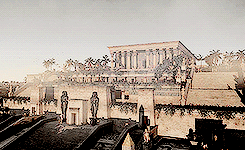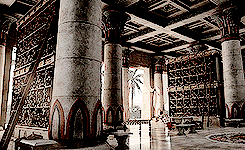THE ROYAL LIBRARY OF ALEXANDRIA↳ as seen on Cosmos: A Spacetime OdysseyThe Royal Library of Alexandr
THE ROYAL LIBRARY OF ALEXANDRIA↳ as seen on Cosmos: A Spacetime OdysseyThe Royal Library of Alexandria, or Ancient Library of Alexandria, was one of the largest and most significant libraries of the ancient world. It was dedicated to the Muses, the nine goddesses of the arts. It flourished under the patronage of the Ptolemaic dynasty and functioned as a major center of scholarship from its construction in the 3rd century BC until the Roman conquest of Egypt in 30 BC. With collections of works, lecture halls, meeting rooms, and gardens, the library was part of a larger research institution called the Musaeum of Alexandria, where many of the most famous thinkers of the ancient world studied. The library was created by Ptolemy I Soter, who was a Macedonian general and the successor of Alexander the Great. Most of the books were kept as papyrus scrolls, and though it is unknown how many such scrolls were housed at any given time, their combined value was incalculable. The library is famous for having been burned resulting in the loss of many scrolls and books, and has become a symbol of the destruction of cultural knowledge. A few sources differ on who is responsible for the destruction and when it occurred. Although there is a mythology of the burning of the Library at Alexandria, the library may have suffered several fires or acts of destruction over many years. Possible occasions for the partial or complete destruction of the Library of Alexandria include a fire set by Julius Caesar in 48 BC, an attack by Aurelian in the AD 270s, and the decree of Coptic Pope Theophilus in AD 391. The library’s index, Callimachus’ Pinakes, was lost with the rest of the library, and it is not possible to know with certainty how large and how diverse the collection may have been. At its height, the library was said to possess nearly half a million scrolls, and, although historians debate the precise number, the highest estimates claim 400,000 scrolls while the most conservative estimates are as low as 40,000, which is still an enormous collection that required vast storage space. This library, with the largest holdings of the age, acquired its collection by laborious copying of originals. Galen spoke of how all ships visiting the city were obliged to surrender their books for immediate copying. The owners received a copy while the pharaohs kept the originals in the library within their museum. [x] -- source link
Tumblr Blog : liketheshewolf.tumblr.com
#history#still hurts







